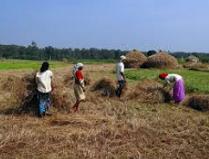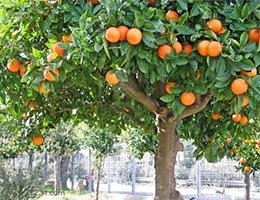 The act of collecting the fruits that the earth provides, generally obtained through crops , is called a harvest . The term also refers to the season in which said collection is carried out, the products that are collected and the set of fruits .
The act of collecting the fruits that the earth provides, generally obtained through crops , is called a harvest . The term also refers to the season in which said collection is carried out, the products that are collected and the set of fruits .
For example: "Next week the harvest will begin throughout the valley" , "During harvest time there are many job opportunities in this area" , "The tomato harvest was very good thanks to the excellent weather conditions in recent months" .
The idea of harvest refers to rural work that involves the collection of fruits, vegetables, seeds or other products that are used by man as food or otherwise. The harvest, which can be done manually or with the help of machinery, is carried out when these products have reached maturity.
The harvest usually includes other tasks in addition to harvesting , such as cleaning the fruits, classifying them, and storing or packaging them so that they can be sent to places of sale.
Typically, field owners analyze what is the best time of year to plant and what is the best period to harvest, using the particularities of the climate to optimize productivity and quality. In any case, there are unpredictable factors (such as floods, droughts, frosts, etc.) that can affect harvests.
People who live in rural areas or who have a large garden usually harvest fruits and vegetables for their own consumption, something that saves them money while allowing them to get closer to nature in a way that is increasingly lost. in modern societies. As tempting as it may seem to have a garden at home, the process is slow and often hopeless, depending on the characteristics of the land and climate .
 The attitude that must reign in any person who wishes to embark on this activity is patience. This is especially necessary if we are interested in fruit trees: while the orchard usually produces results in a few months, from the moment we plant a tree until we can obtain the first satisfactory harvest, it can take several years.
The attitude that must reign in any person who wishes to embark on this activity is patience. This is especially necessary if we are interested in fruit trees: while the orchard usually produces results in a few months, from the moment we plant a tree until we can obtain the first satisfactory harvest, it can take several years.
In any case, each species has its own deadlines, and that is why it is also important to inform yourself before starting to draw up a plan for the future. For example, berry bushes and fig trees typically produce a crop starting at two or three years, much sooner than most others, which can take more than five. Throughout the development stage it is recommended to remove the flowers, so that the plant uses all its energy in growth.
Harvest, finally, is what a person achieves as a consequence of his actions or destiny: «The tennis player's harvest of trophies does not stop: he has already won three tournaments so far this year» , «For many years I studied and I worked endlessly, now it's time to enjoy the harvest .
Just as it happens in the field of agriculture , it is said that "you reap what you sow", an expression that refers to the importance of acting with good intentions, based on the principles of morality and honesty, since each step What we give for this life has an impact according to the quality of our actions. This does not mean that we should be fair only for the interest of being treated fairly, since in this way our attitude would not be one of legitimate altruism and respect for others but rather one of disguised selfishness.
